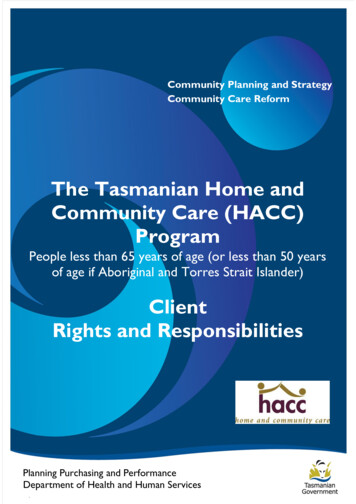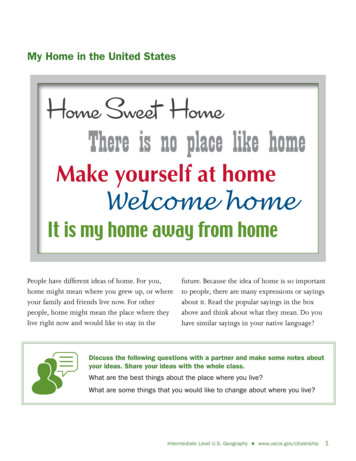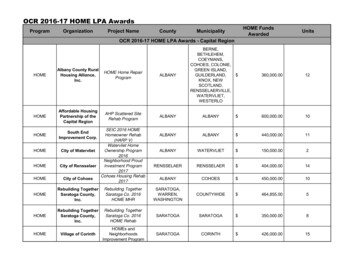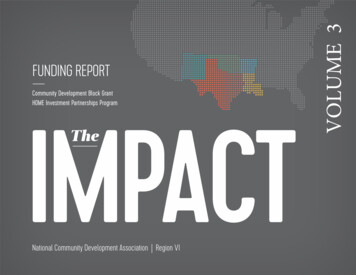
Transcription
Community Planning and StrategyCommunity Care ReformThe Tasmanian Home andCommunity Care (HACC)ProgramPeople less than 65 years of age (or less than 50 yearsof age if Aboriginal and Torres Strait Islander)ClientRights and ResponsibilitiesPlanning Purchasing and PerformanceDepartment of Health and Human Services
Your Rights and Responsibilities as a User of theTasmanian HACC ProgramOrganisations funded by the Tasmanian HACC Program arerequired by Government to maintain certain standards inorder to provide quality care. The Rights andResponsibilities described in this leaflet are all related tothose standards.As a service user of HACC services you have a number ofrights. HACC service providers should recognise your rightto:be treated with respect and courtesybe informed and to be consultedbe part of decisions made about your carereceive good quality servicesprivacy and confidentiality, and to access all personalinformation kept about you by your service have another person of your choice support you andadvocate on your behalf have your comments valued and to make a complaintif you are not happy with the services you receive.
Your Rights as a Service User of TasmanianHACC ServicesThe Right to be Treated with Respect and CourtesyService providers must respect your ideas and the decisionsyou make about your life. They should listen to what youhave to say, and are expected to show courtesy in theirbehaviour to you. Here are some questions you can askservice providers about this right: Will your staff seek my consent if they want accessto my personal belongings? Are staff expected to listen to what I have to sayabout my care? Are staff expected to talk to me in a respectful way? If I think that staff are not treating me with dignity,what can I do? Who should I speak to in the organisation? Who could I speak to outside of the organisation? How familiar is your service with my culturalbackground/religious beliefs? Will staff respect my cultural and religious beliefs? Are staff trained in working with people with specialneeds, such as people from culturally differentbackgrounds or people who suffer from memoryloss?
The Right to be Informed and to be ConsultedAs a service user you have the right to be informed aboutthe service available to you and about your rights as aservice user. These are questions that can help you obtainthe information you need to get the most from a service: What exactly can this organisation provide for me?How often will I receive the service?For how long can I expect to receive the service?What will it cost me?Will I receive an itemised account for the service?Do I have a choice how to pay for the service?If I cannot afford the service, can I request areduction in fees?Can I get the service after hours or on weekends?Will I have the same staff each time?Can I request a change of staff if I am not happy?What happens if I don’t take up the service now andask for it again later?How will I be involved in planning the services youprovide to meet my needs?Can I stop the service at any time?How would I do this?Do you have a written copy of my rights as a serviceconsumer?Can I have the information in a language other thanEnglish?Can I have access to an interpreter?
The Right to be Part of Decisions About Your CareYou have the right to remain in control of the care youreceive by being part of the decisions made about theservices provided to you. You can ask these sorts ofquestions: How will I be involved in developing the plan for mycare? Can I have someone with me during my discussionsabout my care? Do I automatically receive a copy of my care plan? If my needs change, will you review my care planwith me? Can I ask for a male or female worker? Can I choose a time that suits me to receive myservice? Can I ask my worker not to smoke in my home? Will you tell me in writing if there are any changesmade to my service? To whom can I complain about changes made to myservice? How would I do that?The Right to Receive Quality ServicesYour Service Provider needs to inform you about theservices it can and cannot provide. You have the right toreceive a planned and reliable service. To find out moreabout this right you can ask service provider organisationsthese questions:
Do I get regular visit or phone call from theorganisation to find out if I am happy with the serviceI am receiving? Do you provide clients with a copy of informationabout the agency? Do I receive a copy of my plan of care? Am I going to be consulted about any changes madeto the service I receive? Is the organisation flexible about adapting services tomeet my needs? Will I be encouraged to speak up if I have anyconcerns about the service I am receiving? How can Ido this best?The Right to Privacy and ConfidentialityYou have the right to confidentiality and privacy, and toobtain information held about you on file. These areexamples of questions you might ask service providersabout this right: Do you have any written information about my rightsregarding privacy and confidentiality? What sort of personal details do you keep aboutyour clients? (For example, date of birth, income,religion) Where do you keep my personal information? Is it secure? How do you make sure it is secure? Who has access to my file?
Do I have access to my file? What do I have to do if I want to access my file? Who would I talk to if I felt that my privacy orconfidentiality were breached?The Right to an AdvocateEveryone has basic rights as Australian Citizens and theseinclude expressing your views. It can be helpful to havefamily or friends to speak on your behalf, or organisationswhose role it is to advise people about their rights andresponsibilities when receiving services, and to act on yourbehalf with service providers. Organisations like this areknown as advocacy services, and people who act on yourbehalf are known as advocates.As someone using a service funded by the TasmanianHACC Program you have a right to involve an advocate ofyour choice to represent you at any time. These areexamples of questions you can ask service providersregarding your right to advocacy: Can I have a friend, family member or person froman advocacy service to represent me at any time? Do you have written information about my rights asa user of your services? Can I have my rights explained to me by aninterpreter?
Is there an independent advocacy organisation thatcan tell me more about my rights as a HACC serviceuser? How can I contact advocacy services at times ofchanges and distress?The Right to Make a ComplaintAs someone using services funded by the Tasmanian HACCProgram, you have the right to give honest feedback aboutthe service you are receiving without fear of losing theservice, or having it reduced. Service Providers are requiredto have clear written policies for handling complaints fromservice users, and to make sure that their clientsunderstand how those policies are applied. These are somequestions you can ask an organisation: Can I discuss any concerns that I have abut theservice I am receiving? Is there a particular person in the organisation whodeals with complaints? Do I have to put any concernsin writing? Or can I explain it over the phone or talkto someone in person? Is there a certain process Ihave to follow when complaining? Can I ask an advocate to speak on my behalfregarding my concerns? Will my complaint be kept confidential? Will I risk losing my service if I complain?
If I am not happy with the result of my complaint,who else can I talk to within the organisation? Can I have a copy of your organisation’s policy andprocedures for handling complaints?Your Responsibilities as a Service User ofTasmanian HACC Program ServicesWhile you have a number of rights as a service user, youalso have some responsibilities to the organisations and thepeople who provide your care.Tasmanian HACC Program FundedOrganisations ask their Clients to: Treat staff with respect and courtesy – for example,by letting them know as soon as possible if youcannot keep an appointment. Provide a safe work environment for staff and helpthem to provide you with services safely – forexample, by not leaving floors wet and slippery. Take responsibility for the results of any decisionswhich you make with staff about your care. Inform service providers of any changes to yoursupport needs. Raise issues, concerns and complaints directly withservice providers in the first instance.
Provide compliments and positive feedback directlyto service providers.For Further Information Regarding HACCServices:Tasmanian Community Care Referral Service – 1300 769699Advocacy Tasmania Inc. – 1800 005 131 (Freecall TM)As a HACC Client you have rights and responsibilities inregard to the services you access.
Planning Purchasing and PerformanceDepartment of Health and Human ServicesGPO Box 960, Hobart TAS 7001
Tasmanian HACC Program Organisations funded by the Tasmanian HACC Program are required by Government to maintain certain standards in order to provide quality care. The Rights and Responsibilities described in this leaflet are all related to those standards. As a service user of HACC services you have a number of rights.










